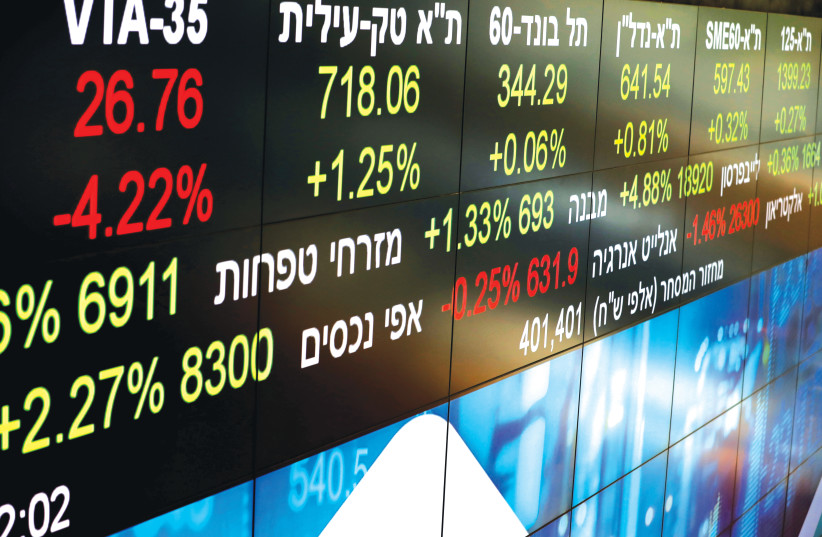As Israel’s hi-tech sector sizzled during the Hebrew year 5781, the Tel Aviv Stock Exchange had a breakout year.
The local bourse boasted 94 initial public offerings, including 63 hi-tech companies, the highest since 1993. In total, NIS 28 billion was raised on the stock market, mostly from tech companies.
“After many dry years on the TASE, there were a lot of companies raising money this year, mostly from the tech sector,” said Guy Mani, chief investment officer at the Meitav Dash investment house. “It is interesting to note that a lot of the technology companies that raised money are not at the stage where they can list on the Nasdaq, but weren’t really relevant for the VC funds either. So we saw an interesting mix of companies, some of which were priced too high for the IPO and saw their values fall, and some excellent companies whose values rose.”
The benchmark TA-35 and TA-90 indices rose by about 33% and 43%, respectively, during the course of the year. For comparison, the S&P 500 rose about 33% during the same period, while leading stock exchanges in Europe saw an average increase of about 26%.
Average daily turnover on the market was NIS 1.8b., similar to the previous year, and about 40% more than the average volume in 2019. TASE volume dropped off about a decade ago when index compiler MSCI reclassified Israel as a developed country, removing it from the portfolios of most emerging market investors.

The growth follows the bourse’s strategy over the past few years to attract and serve as a home for more hi-tech companies.
Shares of real estate companies jumped by about 74% due to an increase in demand for apartments over the course of 5781. Shares of Israel’s large banks rose by about 62%, while oil and gas stocks rose by about 48% due to a sharp rise in commodity prices. It should be noted that these indices dropped by 24%-53% in the previous year due to the pandemic.
Exuberance in the market has given way to greater caution in recent months, as many IPOs posted negative returns. That’s partly because many of those companies weren’t ready for the market, or were priced too high to begin with, Mani said. Others are excellent companies whose stock fell after their first quarterly reports, but have solid long-term outlooks.
“We met with many of these companies, but only invested in a small number,” Mani noted.
Two companies joined the TASE as dual-listed companies during the past year: Nasdaq-traded RADA Electronic Industries and Singapore-listed Sarine Technologies. In addition, medical cannabis company Intercure, which is traded in Tel Aviv, dual-listed on the Toronto Stock Exchange, the first TASE-traded company to do so. In total, there are 52 dual-listed companies on the TASE.
The TASE launched five new stock indices during the year, including one tracking cannabis companies, one tracking dual-listed firms, and two tracking environmentally friendly “green” companies. A new index tracking 19 physical and online retail chains, with a total market value of NIS 34b., was launched this week on Sunday, the last day of trading for 5781.
Mani stressed that the low trading volume levels on the TASE are a challenge for the market, and that because of this, small trades can cause prices to fluctuate quickly. Because liquidity is so low on the TASE, 70% of institutional investments are in overseas markets, he noted.
On the bond market, government bonds had turnover of NIS 3b., similar to the previous year. Efforts to raise money to finance the government’s corona-related expenses kept volume levels from falling. Corporate bond trading volume fell by 19%.
For the coming year, Mani expects the stock market to continue to rise, but not as sharply as last year. With returns in the bond market expected to continue to be near zero, he said the stock market will continue to be the preferred investment vehicle for the foreseeable future.
